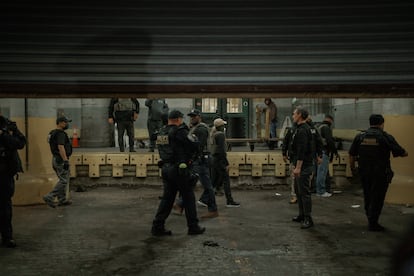The migrants being ambushed in court: ‘Good morning, we are immigration agents. Have you closed your case yet?’
President Trump is doubling down on his war on due process by ordering courthouse detentions, a move that has alarmed advocates for asylum seekers


Inside a Southern California immigration court, the morning seems to be going normally. Judge Christopher McNary is presiding over a hearing for a Mexican immigrant who has sought asylum to avoid deportation to Jalisco, Mexico. The judge denies him this option, a decision that confirms his tendency to say no. McNary, who worked as an attorney for Immigration and Customs Enforcement (ICE), typically rejects seven out of 10 asylum requests that come before his courtroom. The defendant still has until the end of June to file an appeal that could halt his deportation.

U.S. President Donald Trump has brought his war on immigrants to the very doors of these courtrooms. Federal agents carrying out the administration’s deportation crusade have been stationed in the hallways of these 69 courthouses nationwide for several days now. On Thursday of last week, at least 20 agents were prowling the halls of the 22 courthouses in Santa Ana, a conservative stronghold located an hour south of Los Angeles.
“Good morning, we are immigration agents. Have you closed your case yet?” an ICE agent asks in Spanish to a Guatemalan woman who has just set foot outside the courthouse.
It takes only moments for the woman to realize she’s been ambushed. Up to four officers surround her. They’re dressed in black, wearing caps, sunglasses, and bandannas covering their mouths. A few feet behind them are officers with pepper spray, bulletproof vests, firearms and bullet magazines. They’re from Customs and Border Protection (CBP), a force recently mobilized by the president, along with other agencies tasked with financial crimes, weapons analysis, and the fight against drug trafficking, to reinforce the arrest of immigrants inside the country. After a brief interrogation, she is taken away.
The officers had done the same thing minutes earlier to a man who had attended the court date with his family. His young children appeared before another judge in their best clothes. The girl wore a bow and a dress, and her brother, a few years older, wore a plaid shirt. The father wore a neatly ironed white shirt. They all left the building surrounded by immigration officers. In both arrests witnessed by this newspaper, the defendants did not have lawyers.
“In seven years as a lawyer, I’ve never seen this,” admits one attorney who asked not to be named. The lawyer litigated last week in another court. At that time, there was no trace of these law enforcement agencies’ presence inside the courts. ICE agents are currently in courtrooms in 22 states, according to The Washington Post. From Arizona, Tennessee and Texas, where 20 people were detained Wednesday after their hearings, to liberal bastions like New York, Washington State, and California. “They’re crossing lines they didn’t cross before,” the lawyer opines.
On Thursday morning, the legal representative was trying to reassure his clients, a Central American couple who have been in the asylum process for two years. “Don’t worry, ICE can’t touch you, they can’t do anything to you,” he told them as they left the courthouse. The message seemed to resonate with the couple, who stared at their cell phones.

The detentions appear to be concentrated in asylum cases at their earliest stages. These have been quickly dismissed since Joe Biden’s about-face on the issue. Once the case is closed, the applicants become targets of so-called “expedited removal,” which allows authorities to quickly deport people without another hearing before a judge.
Trump promised that upon taking office, he would end the Biden administration’s catch-and-release policy, a practice in which authorities detained illegal immigrants crossing the border and then released them into the country pending court proceedings. The latest strategy, however, exploits the system’s good faith. Immigrants must appear at court hearings to argue before a judge why they cannot return to their countries. Missing these appointments is enough to close the case and initiate deportation proceedings. Now, going before a judge also carries the risk of being detained or deported.
Immigration lawyers have underscored the cruelty of this new tactic. “It’s a blatant betrayal of basic fairness and due process,” said Kelli Stump, president of AILA, the national immigration litigation association. “It completely corrupts these immigration courts, turning them from a forum for justice into a cog in the vast deportation apparatus,” she added in a statement.
The organization stated this Friday that most of the detainees were people who were apprehended near the border and later released. They have been in the country for less than two years and include individuals with pending asylum applications. Among those arrested are people with young children. In at least one case, AILA says, one of the detainees had a lawyer present, and the judge had decided to press ahead with the proceedings. This didn’t matter to those who took him away.
The arrests are taking place away from the public eye, inside nondescript buildings like the one in Santa Ana, a building in an industrial park that shares space with technology companies. Outside the courthouse, three young men were handing out so-called red cards, small pieces of cardboard that remind immigrants of their rights, to those entering the building. The young men are part of Orange County’s rapid response network, a community movement attempting to respond to Washington’s immigration policies.

Courts have recently become a focal point for protests. Dozens of people gathered in San Francisco on Wednesday of last week outside a federal courthouse to condemn the arrest of four asylum seekers the day before. Protesters appeared with signs condemning ICE and stating “Hands off immigrants.”
“It’s a clear violation of the Constitution and due process,” said Mili Atkinson, a lawyer with a local immigration law group, during the protest Wednesday. Also present at the protest were non-governmental organizations like Mission Action, which has vowed to fight the new policy.
The Department of Homeland Security said in a statement that these types of actions are aimed at “reestablishing the rule of law” after the Biden administration “released millions of undocumented immigrants onto the streets of the country without investigation.” If those detained have a valid claim of risk in their countries, they will be able to continue their proceedings. If one is not found, they will face swift deportation, the agency stated on May 22.
The measure adds to the offensive launched by the Republican administration. Many of the tools in the hands of Trumpism have set off alarm bells among legal experts and activists. These include the detention and deportation of immigrants to third countries, the resumption of family detention, the closure of Homeland Security offices responsible for ensuring that agents respect human rights, and eliminating the position of immigrant advocate. In Trump’s United States, anything goes.
Sign up for our weekly newsletter to get more English-language news coverage from EL PAÍS USA Edition
Tu suscripción se está usando en otro dispositivo
¿Quieres añadir otro usuario a tu suscripción?
Si continúas leyendo en este dispositivo, no se podrá leer en el otro.
FlechaTu suscripción se está usando en otro dispositivo y solo puedes acceder a EL PAÍS desde un dispositivo a la vez.
Si quieres compartir tu cuenta, cambia tu suscripción a la modalidad Premium, así podrás añadir otro usuario. Cada uno accederá con su propia cuenta de email, lo que os permitirá personalizar vuestra experiencia en EL PAÍS.
¿Tienes una suscripción de empresa? Accede aquí para contratar más cuentas.
En el caso de no saber quién está usando tu cuenta, te recomendamos cambiar tu contraseña aquí.
Si decides continuar compartiendo tu cuenta, este mensaje se mostrará en tu dispositivo y en el de la otra persona que está usando tu cuenta de forma indefinida, afectando a tu experiencia de lectura. Puedes consultar aquí los términos y condiciones de la suscripción digital.








































